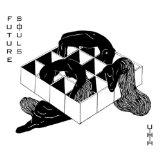 The objective Zola Jesus set herself for her fourth album was to face her own fears about how her love for pop music would eventually have to inform her work and what that might sound like. It is significant maybe that the oldest song here and the one that finally forced Jesus into the glare of potential mainstream and started the ball rolling, “Dangerous Days”, is also the purest pop song on “Taiga”. It has a brightness that contradicts its title, a brilliant pre chorus, an actual chorus which is only slightly less captivating and a sonic energy that’s slick and addictive and brings to mind the slightly more intricate and risky songs from Madonna’s mighty “Ray of Light” album.
The objective Zola Jesus set herself for her fourth album was to face her own fears about how her love for pop music would eventually have to inform her work and what that might sound like. It is significant maybe that the oldest song here and the one that finally forced Jesus into the glare of potential mainstream and started the ball rolling, “Dangerous Days”, is also the purest pop song on “Taiga”. It has a brightness that contradicts its title, a brilliant pre chorus, an actual chorus which is only slightly less captivating and a sonic energy that’s slick and addictive and brings to mind the slightly more intricate and risky songs from Madonna’s mighty “Ray of Light” album.
The remainder of Taiga is not really a pop record although it frequently aspires to be one. Soundscapes are stripped almost entirely of any of the glitch that featured on 2011’s “Conatus” or the muddy density on her brilliant breakthrough album “Stridulum II” and replaced by something that is undeniably big and rich but simpler and more concentrated than before. A lot of the songs have beautiful, powerful intermissions; it’s just that too frequently the melodies are lacking the strength to push these tracks to required level, the one which you presume she had in her sights. Dean Hurley co-produces with Jesus and is an odd choice given his primary job as David Lynch’s new sound man, responsible for producing both of Lynch’s inconsistent and naive solo albums, and hardly a name synonymous with making music that can be sung along to. There are references here to the Ryan Tedder meets Sia school of Beyoncé power pop on the crashing but dull “Lawless” and the Rihanna-phrased “Long Way Down” but neither songs would pass the pop queen’s test of a tune that hijacks relentlessly.
The more successful tracks, and “Taiga’” is the definition of a front-loaded album, happen in the first half. “Dust” has a woozy, avant r’n’b doo-wop swing which is hypnotising and commercially-minded and “Go (Blank Sea)” like Petula Clark, and hundreds after her, successfully sees Jesus pining for the eternal pop never-never land of “Downtown”. “Hunger” has a thrusting and bewildering attack of beats, brass and synths – at one point it’s hard to distinguish between the two- and a glacial, persistent string part and is exhilarating and sharply euphoric. “Ego” is a suspended hymn of considerable power where all of “Taiga”’s elements fall into place; a lucid and possessed vocal interrupted by sheets of brass that morph effortlessly into aching strings. The ongoing presence of strings and brass in particular bear out the theory that “Taiga” is more of a continuation of the stripped down “Versions” of last year then something you might hear in a bar. From here on in and midway through “Taiga”’s playing time the focus is lost, however, and gives way to repetition and mediocre tunes. “Hollow”, for example, attempts to salvage some drama and presence but is an oddly similar reimagining of the far superior “Hunger”.
Since the release of “Taiga”, Jesus has been remixed by the likes of The Juan Maclean and Diplo, a still relatively underground sophisticated pop-dance act, and the man rumoured to be producing the next Madonna album. Both artists have done commendable jobs in highlighting the hooks in what were admittedly already two of the album’s stronger songs (“Dangerous Days” and “Go”). Where their real strength lies, though, is in taking Jesus’ music to a demographic previously unaware of her and potentially initiating an interest to investigate further. This is where Jesus and “Taiga” stumble as the initial promise of something different and more accessible is never really delivered so new fans are unlikely to convert and current ones will be dissatisfied at the loss of the incredible depth and half-shaded mystery that permeated her earlier work. A good album still with some great songs but “Taiga” doesn’t quite provide the soundtrack that Zola Jesus commands and deserves, whether she continues to chase her big pop arrival remains to be seen but you feel that this isn’t it.
 The third album by LA-based female duo Uh Huh Her is meant to be their concession to dance music, not that you couldn’t play their previous material in a club but “Future Souls” is intended to take you further into the realm of abandoned dance floor hedonism. Camila Grey and Leisha Hailey should be congratulated for showing restraint and not making the EDM-polluted monstrosity that this could have been. It doesn’t chase trends and there are no David Guetta or will.i.am attempts at shoehorning six different sub genres into a four minute track. But then Uh Huh Her haven’t really made a dance record here at all. This album is in fact more of a continuation of their elegant, electro-pop sound but with considerably more electronics and fewer guitars. Whether it has reinforced and strengthened their position in a very crowded and ambitious arena will be mainly dependent on their songwriting skills and ability to establish a more defined personality – something they have struggled with before.
The third album by LA-based female duo Uh Huh Her is meant to be their concession to dance music, not that you couldn’t play their previous material in a club but “Future Souls” is intended to take you further into the realm of abandoned dance floor hedonism. Camila Grey and Leisha Hailey should be congratulated for showing restraint and not making the EDM-polluted monstrosity that this could have been. It doesn’t chase trends and there are no David Guetta or will.i.am attempts at shoehorning six different sub genres into a four minute track. But then Uh Huh Her haven’t really made a dance record here at all. This album is in fact more of a continuation of their elegant, electro-pop sound but with considerably more electronics and fewer guitars. Whether it has reinforced and strengthened their position in a very crowded and ambitious arena will be mainly dependent on their songwriting skills and ability to establish a more defined personality – something they have struggled with before.
An interesting reference point here is girl group All Saints, produced by William Orbit; very occasionally the quality comes closer to Orbit’s definitive work with Madonna on “Ray of Light”. It has a late 90’s naiveté both vocally and sonically, which can sound undernourished but can also shine and warm through with harmonies that can swell up unexpectedly, from an intro for example. And there are some good songs here too. Album opener “Innocence”, for example, creates a steady impression and beneath a lightly bouncing acid house synth motif the melodies morph into something smooth but sticky; it’s a surprise when it finally clicks. “Bullet” has a nicely thought out structure and nagging chorus and “Time” sounds a bit like a highly-polished Wendy and Lisa.
For a dance album it’s maybe surprising that the two best songs on “Future Souls” are the most introverted and intimate. “Strange Design” is both nurturing and arms-length, slowly spinning and calm with an obvious deb to the spooked and lush ballads of “Supernature”- era Goldfrapp. “Interconnect” is satisfyingly bolshy, with a cool and confident vocal but it’s still as considered and graceful as anything you would come to expect from the duo’s best material. And that is what reinforces the frustrations experienced elsewhere within the ten tracks found here. The evidence that the band can push themselves to make something memorable and compelling is often undermined by pleasant by completely disposable filler such as the auto tuned cliché of “It’s Chemical” and the thinness of “Nuthin Without Your Love” could be any one of an army of faceless electronics acts.
Uh Huh Her have a sizeable cult following that is undeniably linked to Leisha Hailey’s performance as Alice Pieszecki in the garish but often riveting series, The L Word. Hailey was the only out lesbian playing a lesbian in a show about lesbians. Her character was charismatic and spiky and in many ways the show’s moral compass – if only some of that character’s utter self-possession could be transposed to the duo’s musical ventures. Au Revour Simone, Chvrches and School of Seven Bells should be Uh Huh Her’s synth sisters in crime but where those female lead, synth-preoccupied groups each have an identifiable sound, UHH still suffer from a stranded sense of identity. This could be avoided if, instead of relying on self-production, the women allowed themselves to be guided and pushed by another studio professional. Although “Future Souls” is competent enough, let’s hope that the next album is the one that fully reveals the duo’s idiosyncrasies and tics in ways which are still only hinted at here.


